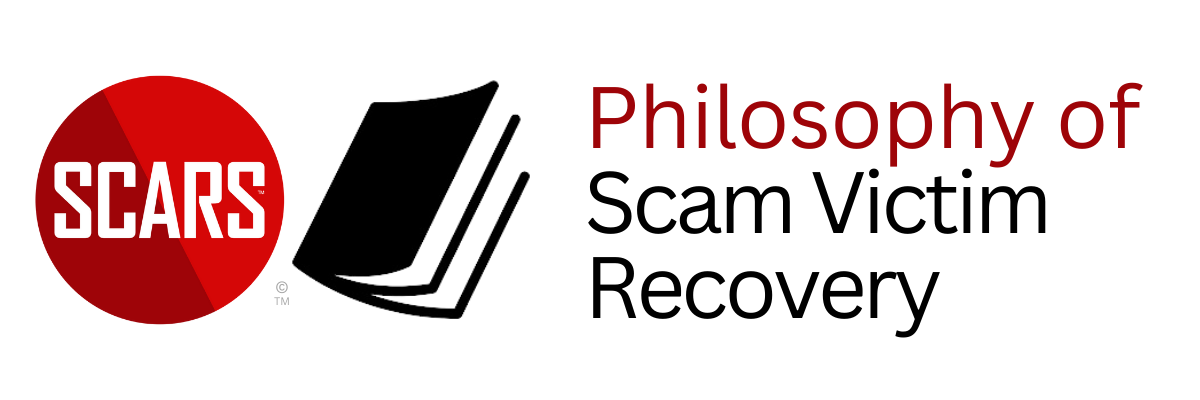Arthur Schopenhauer ‘The Pain of Life’ – Understanding a Philosophical View of Suffering
Arthur Schopenhauer’s View on Attachment and Suffering and How It Applies to Scam Victims
Primary Category: Philosophy of Scam Victim Recovery
Author:
• Tim McGuinness, Ph.D., DFin, MCPO, MAnth – Anthropologist, Scientist, Polymath, Director of the Society of Citizens Against Relationship Scams Inc.
About This Article
Arthur Schopenhauer’s philosophy on attachment and suffering can offer valuable insights for scam victims dealing with emotional trauma. He believed that human suffering is rooted in attachments to desires, people, or material things, which are inherently impermanent.
For scam victims, emotional recovery involves recognizing that their attachment to the illusion of what was lost—whether money, relationships, or trust—is the source of their suffering. By accepting life’s impermanence, practicing detachment, and focusing inward, victims can find emotional freedom and begin healing from the trauma of their experience.

Arthur Schopenhauer’s View on Attachment and Suffering and How it Applies to Scam Victims
Arthur Schopenhauer’s view on attachment and suffering centers around the idea that human desires and attachments are the primary causes of suffering. In his philosophy, Schopenhauer believed that our desires, rooted in the will to live, create a continuous cycle of longing and dissatisfaction. Since the material world is inherently fleeting and unsatisfactory, the attachment to things, people, or outcomes only leads to inevitable disappointment or loss. For him, the key to minimizing suffering lies in reducing attachment to external things, thus freeing oneself from the turmoil caused by the constant desire for fulfillment.
How Attachments Work and What They Are
Attachments, in a philosophical and psychological sense, refer to emotional bonds or connections individuals form with objects, people, experiences, or even ideas. These attachments are often driven by desires, as humans seek pleasure, security, or a sense of identity from the things they attach themselves to. Schopenhauer emphasized that these attachments are inherently problematic because they are directed at objects or conditions that are transient and prone to change.
When individuals attach themselves to material possessions, relationships, or specific outcomes, they place their happiness and well-being in the hands of things outside their control. Since the nature of life is change, loss, and impermanence, attachments set the stage for future suffering when those things inevitably change or disappear. This is why, for Schopenhauer, the more someone is attached to worldly desires, the greater their suffering when they lose what they are attached to.
Application to Scam Victims
For scam victims, Schopenhauer’s philosophy of attachment can provide insight into the emotional trauma they experience after being deceived. Victims of scams often develop attachments during fraud, whether it’s an emotional attachment in the case of romance scams or a financial attachment in investment fraud. These attachments are often based on false promises, where victims believe they have secured something valuable—a relationship, financial gain, or personal achievement.
Once the scam is revealed, victims not only suffer from the material loss (money, time, etc.) but also from the emotional pain tied to the attachment they formed. They may feel a deep sense of betrayal, guilt, or shame, all of which are intensified by the fact that they had invested emotionally or financially into something they thought was real.
Reducing Suffering by Letting Go of Attachments
Applying Schopenhauer’s view to recovery from a scam involves recognizing that the attachment to what was lost is the root of the emotional suffering. Victims can begin to recover by detaching from the fraudulent relationship or false hope of financial gain, and instead accepting that those attachments were built on illusions. While this process is difficult, it can be healing when victims realize that their suffering is tied not only to the loss itself but also to their attachment to that loss.
Schopenhauer’s suggestion for reducing suffering—by letting go of desires and recognizing the impermanence of all things—can serve as a guide for scam victims. Instead of dwelling on the betrayal or financial loss, victims can focus on accepting what has happened and, most importantly, understand that their identity or happiness does not depend on what they were deceived into believing.
Practical Steps for Scam Victims Based on Schopenhauer’s Philosophy
Acknowledge the Pain: The first step is recognizing the emotional pain caused by the scam, but also understanding that this pain is amplified by attachment.
Practice Non-Attachment: Victims can work toward releasing their attachment to the scam’s promises, understanding that they were illusions. Mindfulness practices or therapy can assist in this process.
Shift Focus Inward: Instead of looking outward for validation (from money, relationships, etc.), victims can focus on cultivating inner strength and self-worth. Detaching from external circumstances provides emotional freedom.
Accept Impermanence: Recognize that all things, whether money, relationships, or opportunities, are temporary. By accepting impermanence, victims can lessen the emotional blow when things are lost.
In conclusion, Schopenhauer’s view that suffering is tied to our attachments and desires can provide scam victims with a framework for recovery. By learning to detach from the illusion of what they lost and accepting life’s impermanence, they can reduce their emotional suffering and begin the journey of healing.
Accepting Impermanence and Uncertainty
To fully embrace Schopenhauer’s philosophy of overcoming suffering, scam victims must come to terms with the impermanence of everything. Attachments are often formed with the expectation that things, people, or outcomes will be permanent or stable, yet life is inherently uncertain. Accepting impermanence means understanding that everything is subject to change and that clinging to anything—whether material wealth, relationships, or emotional states—inevitably leads to suffering when they are lost or altered.
For scam victims, this step involves acknowledging that no matter how carefully they may have protected themselves, the reality of scams, loss, or betrayal could still occur. Victims can find peace in the understanding that uncertainty is part of the human condition. Instead of being trapped in fear of future losses or regrets about the past, they can focus on living fully in the present moment. Learning to trust in the flow of life, despite its unpredictability, allows them to let go of rigid expectations and heal emotionally from the trauma.
Practical Steps to Accept Impermanence and Move Forward:
- Acknowledge that nothing is permanent: This truth is the foundation of letting go. When victims accept that all things—relationships, money, or security—are subject to change, they can begin to release their emotional hold on the past.
- Find peace in uncertainty: Instead of fearing the unknown, practice embracing it. By understanding that uncertainty is inevitable, victims can learn to flow with life’s changes rather than resist them.
- Mindfulness practice: Meditation and mindfulness can help scam victims stay grounded in the present moment, reducing anxiety over what was lost or what may happen next.
- Rebuild trust in oneself: Rather than focusing on external control, victims can build confidence in their ability to navigate uncertainty with resilience, making them more adaptable and stronger in future challenges.
- Release the illusion of control: Recognizing that full control over life is impossible can help victims detach from harmful attachments and lead to emotional freedom, reducing suffering over the long term.
The Downside of Being Unable to Accept Impermanence
The inability to accept impermanence and let go of attachments is closely tied to trauma and grief. When someone experiences trauma or loss, their attachments to what was lost—whether it’s a relationship, a sense of security, or a future they envisioned—can cause deep, lingering pain. This resistance to change leads to emotional suffering, as they struggle to reconcile their reality with what they desired. In trauma, the mind often replays the loss, unable to move forward, while in grief, the attachment to the past amplifies the pain of absence.
This inability to release attachments keeps individuals in a state of emotional turmoil, making it harder for them to process their trauma and grief. Accepting impermanence allows them to acknowledge that loss and change are inevitable parts of life. Without this acceptance, individuals may become stuck in their suffering, feeling powerless and unable to heal. Learning to let go of attachments helps in finding peace and resilience, even amid difficult emotional experiences like trauma and grief. By embracing the impermanence of life, they can gradually release the weight of their pain and begin the journey toward recovery.
Conclusion
Arthur Schopenhauer’s philosophy on attachment and suffering provides a deep understanding of why human attachment to desires, material possessions, or outcomes often results in emotional turmoil. For scam victims, this attachment can exacerbate the emotional pain they feel after experiencing loss, betrayal, or financial ruin. Schopenhauer believed that human suffering arises from the constant desire for satisfaction and permanence, despite life’s inherently fleeting nature. Scam victims, who often develop emotional or financial attachments to what they have lost, experience significant psychological trauma due to these attachments. Whether it’s a romantic relationship built on deception or financial security taken away, the attachment to the desired outcome makes the resulting loss more devastating.
The key to reducing this suffering lies in accepting impermanence and letting go of these attachments. Schopenhauer suggested that by recognizing the temporary nature of all things—relationships, possessions, and even emotional states—individuals can start to detach from their desires and reduce the emotional suffering tied to them. Scam victims, when they focus on the impermanence of their loss and avoid clinging to their past experiences, can start to heal and reclaim their sense of identity. Releasing attachment to the past enables them to process their grief and trauma with less resistance, fostering personal growth and recovery. Without this acceptance, individuals remain trapped in a cycle of suffering, unable to move past their loss. By embracing impermanence, victims can develop resilience, reframe their experiences, and move forward with emotional freedom.
-/ 30 /-
What do you think about this?
Please share your thoughts in a comment below!
Statement About Victim Blaming
SCARS Institute articles examine different aspects of the scam victim experience, as well as those who may have been secondary victims. This work focuses on understanding victimization through the science of victimology, including common psychological and behavioral responses. The purpose is to help victims and survivors understand why these crimes occurred, reduce shame and self-blame, strengthen recovery programs and victim opportunities, and lower the risk of future victimization.
At times, these discussions may sound uncomfortable, overwhelming, or may be mistaken for blame. They are not. Scam victims are never blamed. Our goal is to explain the mechanisms of deception and the human responses that scammers exploit, and the processes that occur after the scam ends, so victims can better understand what happened to them and why it felt convincing at the time, and what the path looks like going forward.
Articles that address the psychology, neurology, physiology, and other characteristics of scams and the victim experience recognize that all people share cognitive and emotional traits that can be manipulated under the right conditions. These characteristics are not flaws. They are normal human functions that criminals deliberately exploit. Victims typically have little awareness of these mechanisms while a scam is unfolding and a very limited ability to control them. Awareness often comes only after the harm has occurred.
By explaining these processes, these articles help victims make sense of their experiences, understand common post-scam reactions, and identify ways to protect themselves moving forward. This knowledge supports recovery by replacing confusion and self-blame with clarity, context, and self-compassion.
Additional educational material on these topics is available at ScamPsychology.org – ScamsNOW.com and other SCARS Institute websites.
-/ 30 /-
What do you think about this?
Please share your thoughts in a comment below!
One Comment
Leave A Comment
TABLE OF CONTENTS
- Arthur Schopenhauer’s View on Attachment and Suffering and How It Applies to Scam Victims
- About This Article
- Arthur Schopenhauer’s View on Attachment and Suffering and How it Applies to Scam Victims
- How Attachments Work and What They Are
- Application to Scam Victims
- Reducing Suffering by Letting Go of Attachments
- Practical Steps for Scam Victims Based on Schopenhauer’s Philosophy
- Accepting Impermanence and Uncertainty
- Practical Steps to Accept Impermanence and Move Forward:
- The Downside of Being Unable to Accept Impermanence
- Conclusion
CATEGORIES
![NavyLogo@4x-81[1] Arthur Schopenhauer 'The Pain of Life' - Understanding a Philosophical View of Suffering - 2024](https://scamsnow.com/wp-content/uploads/2025/04/NavyLogo@4x-811.png)
ARTICLE META
Important Information for New Scam Victims
- Please visit www.ScamVictimsSupport.org – a SCARS Website for New Scam Victims & Sextortion Victims.
- SCARS Institute now offers its free, safe, and private Scam Survivor’s Support Community at www.SCARScommunity.org – this is not on a social media platform, it is our own safe & secure platform created by the SCARS Institute especially for scam victims & survivors.
- SCARS Institute now offers a free recovery learning program at www.SCARSeducation.org.
- Please visit www.ScamPsychology.org – to more fully understand the psychological concepts involved in scams and scam victim recovery.
If you are looking for local trauma counselors, please visit counseling.AgainstScams.org
If you need to speak with someone now, you can dial 988 or find phone numbers for crisis hotlines all around the world here: www.opencounseling.com/suicide-hotlines
Statement About Victim Blaming
Some of our articles discuss various aspects of victims. This is both about better understanding victims (the science of victimology) and their behaviors and psychology. This helps us to educate victims/survivors about why these crimes happened and not to blame themselves, better develop recovery programs, and help victims avoid scams in the future. At times, this may sound like blaming the victim, but it does not blame scam victims; we are simply explaining the hows and whys of the experience victims have.
These articles, about the Psychology of Scams or Victim Psychology – meaning that all humans have psychological or cognitive characteristics in common that can either be exploited or work against us – help us all to understand the unique challenges victims face before, during, and after scams, fraud, or cybercrimes. These sometimes talk about some of the vulnerabilities the scammers exploit. Victims rarely have control of them or are even aware of them, until something like a scam happens, and then they can learn how their mind works and how to overcome these mechanisms.
Articles like these help victims and others understand these processes and how to help prevent them from being exploited again or to help them recover more easily by understanding their post-scam behaviors. Learn more about the Psychology of Scams at www.ScamPsychology.org
SCARS INSTITUTE RESOURCES:
If You Have Been Victimized By A Scam Or Cybercrime
♦ If you are a victim of scams, go to www.ScamVictimsSupport.org for real knowledge and help
♦ SCARS Institute now offers its free, safe, and private Scam Survivor’s Support Community at www.SCARScommunity.org/register – this is not on a social media platform, it is our own safe & secure platform created by the SCARS Institute especially for scam victims & survivors.
♦ Enroll in SCARS Scam Survivor’s School now at www.SCARSeducation.org
♦ To report criminals, visit https://reporting.AgainstScams.org – we will NEVER give your data to money recovery companies like some do!
♦ Follow us and find our podcasts, webinars, and helpful videos on YouTube: https://www.youtube.com/@RomancescamsNowcom
♦ Learn about the Psychology of Scams at www.ScamPsychology.org
♦ Dig deeper into the reality of scams, fraud, and cybercrime at www.ScamsNOW.com and www.RomanceScamsNOW.com
♦ Scam Survivor’s Stories: www.ScamSurvivorStories.org
♦ For Scam Victim Advocates visit www.ScamVictimsAdvocates.org
♦ See more scammer photos on www.ScammerPhotos.com
You can also find the SCARS Institute’s knowledge and information on Facebook, Instagram, X, LinkedIn, and TruthSocial
Psychology Disclaimer:
All articles about psychology and the human brain on this website are for information & education only
The information provided in this and other SCARS articles are intended for educational and self-help purposes only and should not be construed as a substitute for professional therapy or counseling.
Note about Mindfulness: Mindfulness practices have the potential to create psychological distress for some individuals. Please consult a mental health professional or experienced meditation instructor for guidance should you encounter difficulties.
While any self-help techniques outlined herein may be beneficial for scam victims seeking to recover from their experience and move towards recovery, it is important to consult with a qualified mental health professional before initiating any course of action. Each individual’s experience and needs are unique, and what works for one person may not be suitable for another.
Additionally, any approach may not be appropriate for individuals with certain pre-existing mental health conditions or trauma histories. It is advisable to seek guidance from a licensed therapist or counselor who can provide personalized support, guidance, and treatment tailored to your specific needs.
If you are experiencing significant distress or emotional difficulties related to a scam or other traumatic event, please consult your doctor or mental health provider for appropriate care and support.
Also read our SCARS Institute Statement about Professional Care for Scam Victims – click here
If you are in crisis, feeling desperate, or in despair, please call 988 or your local crisis hotline – international numbers here.
More ScamsNOW.com Articles
A Question of Trust
At the SCARS Institute, we invite you to do your own research on the topics we speak about and publish. Our team investigates the subject being discussed, especially when it comes to understanding the scam victims-survivors’ experience. You can do Google searches, but in many cases, you will have to wade through scientific papers and studies. However, remember that biases and perspectives matter and influence the outcome. Regardless, we encourage you to explore these topics as thoroughly as you can for your own awareness.
























![scars-institute[1] Arthur Schopenhauer 'The Pain of Life' - Understanding a Philosophical View of Suffering - 2024](https://scamsnow.com/wp-content/uploads/2025/04/scars-institute1.png)

![niprc1.png1_-150×1501-1[1] Arthur Schopenhauer 'The Pain of Life' - Understanding a Philosophical View of Suffering - 2024](https://scamsnow.com/wp-content/uploads/2025/04/niprc1.png1_-150x1501-11.webp)
Great article. Change is the only permanent in life and we need to be resilient to adapt to it.